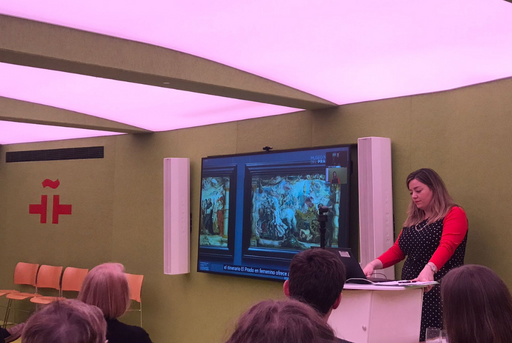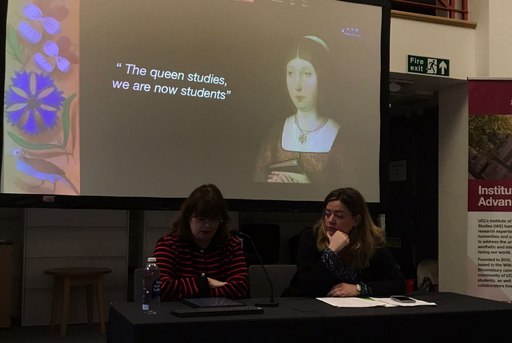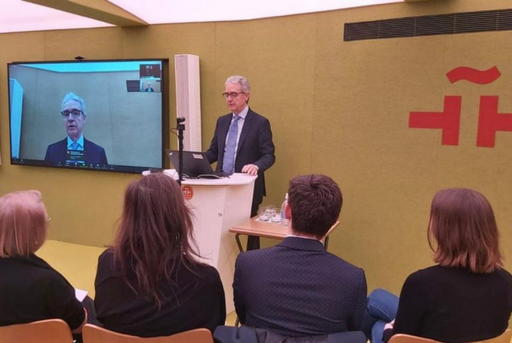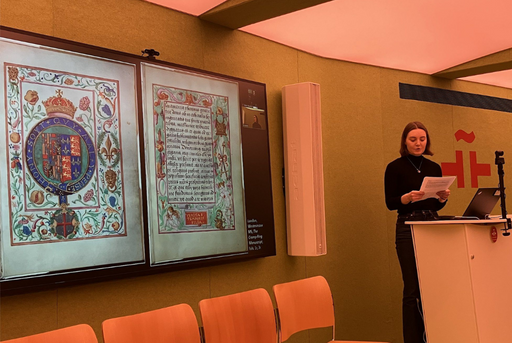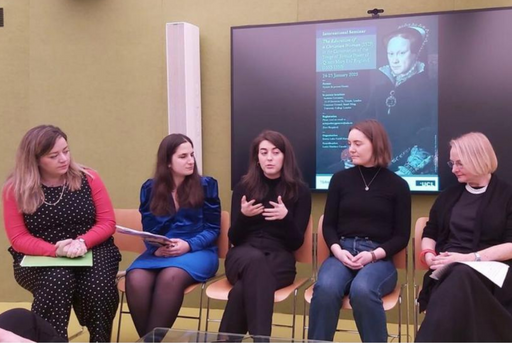International Seminar: The Education of a Christian Woman (1523) in the Construction of the Image of Female Power of Queen Mary I of England (1553-1558)
On 24-25 January 2023 took place in London the international seminar “The Education of a Christian Woman (1523) in the Construction of the Image of Female Power of Queen Mary I of England (1553-1558)”. This conference was celebrated in a hybrid format at the Instituto Cervantes London and the University College London. The seminar was also sponsored by the research group Arte, Poder y Género, and the BritishSpanish Society. It was organized by Dr. Emma Luisa Cahill Marrón, 2022 BritishSpanish Society and Santander Universities UK Scholar, and coordinated by Laura Martínez Cayado, Predoctoral Fellow from the University of Murcia. The goal was to celebrate the 500th anniversary of the publication of The Education of a Christian Woman, a key work first written in 1523 and dedicated to Princess Mary Tudor future Queen Mary I of England. The author was Spanish humanist Juan Luis Vives who was pensioned by Princess Mary’s mother Queen Catherine of Aragon. As well as this work focused on the different stages of a Christian woman’s life: as maiden, married woman, and as widow, Vives created a curriculum to educate Mary. This was entrusted to him by the Queen of England who wanted Mary to be ready to fulfill her dynastic role. But in the case of The Education of a Christian Woman, it had a wider audience in mind. It was an instant success throughout Europe with many reprints, and it became the most influential work of its kind in the Modern Age.
The first day was focused on the visual arts and the use of the teachings in this book in the construction of the image of power of Queen Mary I. The opening address was given by José Pascual Marco, Spanish Ambassador to the United Kingdom. This was followed by a conference by Dr. Emma Cahill Marrón about the Christian women in the portrait exchanges between the Spanish Monarchy and the Tudor dynasty. This showcased the visual female references that Mary grew up with in royal residences like Whitehall Palace. This was followed by a detailed study of her iconography as the first Queen Regnant presented by Peter Stiffell. The final session was devoted to a roundtable with different specialists in Tudor visual culture and in Spanish art. Some of the main topics analyzed were the representation of pregnancy in portraits in Renaissance England, the role that Queen Mary’s marriage to Philip of Habsburg had in the construction of her memory after her death, or the continuity and innovation between Queen Catherine of Aragon and her daughter when it came to crafting the image of Mary as Queen of England.
The second day started with a talk by Dr. Melania Soler Moratón on the education of the daughters of Queen Isabella I of Castile. She analyzed the relation that the four daughters of the Castilian queen developed with books and manuscripts as well as the ones they took to their final destinations. This was followed by a talk by Dr. Emma Cahill Marrón on the patronage relationship established between Queen Catherine of Aragon and Juan Luis Vives. The profound intellectual connection between the queen and the scholar is a testament to the importance that this had in the development of Vives’ educational works and Humanistic career. The morning ended with a talk from Professor Alexander Samson on the challenges researchers face studying early modern women in the archive. He also presented new ways in which we can overcome those using innovative approaches.
The afternoon session started with a talk with Dr. Valerie Schutte focused on the reprints of the work in the nineteenth and twentieth centuries. She addressed the changing roles Catherine of Aragon and others had on each of the reprints. Melita Thomas presented a talk about the friendship network that Queen Mary I constructed during her formative years. She also delved into how these relationships were often used during Mary’s reign as a source of political capital. The keynote address was given by Dr. Elena Woodacre who drew very interesting conclusions about the importance of The Education of a Christian Woman in the context of wider queenly education.
This seminar proved to be a very successful interdisciplinary scientific event. The speakers proposed many new lines of enquiry and research that they hope to study in the future and that stem from this seminar. Many of the more than 250 attendees expressed their positive feedback about the lessons learned and many encouraged the speakers to continue collaborating in this exciting line of research.
